News
Cherokee Nation
Posted: Dec 10, 2020 1:49 PMUpdated: Dec 10, 2020 1:50 PM
PODCAST: Chief Hoskin Talks COVID-19, Connectivity and the Durbin Feeling Center

Tom Davis
Principal Chief of Cherokee Nation, Chuck Hoskin Jr., recently appeared on COMMUNITY CONNECTION to discuss COVID-19 and several other topics from the Gagui Portal, to The Cherokee Warriors Database, Internet Connectivity and the Durbin Feeling Center.
Hoskin quickly reminded Cherokees to mask up to slow the pread of COVID-19 while also asking tribal members to stay home for Christmas as well.
Hoskin says Cherokee Nation is ready and waiting to the COVID-19 vaccine from Pfizer to arrive. When it does, healthcare workers and first responders will get the first doses followed by the elderly and most vulnerably citizens.
Cherokee Nation has many drive-through testing facilities, including the onein Ochelata. Hoskin hopes to turn those sites into vaccine distribution centers once the vaccine becomes available for the public at-large.
Chief Hoskin is also getting Cherokee Nation to become more tech savy.
To streamline personal information management for Cherokee Nation citizens, Cherokee Nation recently launched the new “Gadugi Portal.” Here, Cherokees can manage or update their essential information with the tribe, including things like a new mailing address, name change, date of birth or veteran status.
Once a citizen registers and makes their personal updates, the collected information will be accessible by key Cherokee Nation departments, such as Registration and the Cherokee Veterans Center. Cherokee Nation’s tag offices, Education Services, Housing Authority, Health Services and other critical areas will soon be connected and able to access the database, ensuring that your information is uniformly available to these departments when you need services.
The new portal also empowers every tribal citizen. Because it is centralized, the database allows Cherokee Nation citizens to take charge of their personal information, ensuring it is correct and up to date with just a few clicks.
The COVID-19 pandemic has had an impact on the need to create changes on the tribe's end that help us to expedite services to you and to eliminate duplicate information held in dozens of separate databases. Hoskin said they have explored how to strategically use technology in the management and sharing of citizen data. Ultimately, the Gadugi Portal will allow us to use the information in a way that enables us to do more for our people.
If you are a Cherokee Nation citizen, please take time to visit the portal and update your vital information: https://gadugiportal.cherokee.org/.
The Cherokee Warriors Database, a centralized portal to identify thousands of Cherokee veterans across the globe, is now live for tribal citizens who have served or are serving in the Armed Forces to register.
“We know that Cherokees serve in the United States military at greater per-capita rates than other ethnicities, and have fought in every major conflict and war since this country was founded, and it’s been a challenge over the years to identify and serve each Cherokee veteran,” Principal Chief Chuck Hoskin Jr. said. “What better way to serve and support our veterans than to do this from our centralized Cherokee Warriors Database, connecting all departments in the Cherokee Nation.”
The Cherokee Warriors Database can be found at https://gadugiportal.cherokee.org/
The COVID-19 pandemic has changed the way we work, get an education, get health care, buy groceries, apply for assistance, search for jobs and more. Affordable, reliable internet has become essential for safely accomplishing many of these basic tasks that are normally done in person. Hoskin said," As we see rapidly changing developments in our efforts to fight this pandemic, high-speed connectivity allows us to better communicate how to access services and stay safe."
This has been a challenge to the Cherokee Nation reservation, especially in the many rural communities. Hundreds of Cherokee families live in places without access to affordable, reliable broadband. Cherokee Nation is currently surveying Cherokee households to better understand where the biggest gaps may exist.
"While we investigate the larger problem," said Hoskin, "we are moving immediately to make sure our K-12 students can access the internet for their education. Even before the pandemic, many students were using some combination of in-person and virtual learning. A strong education of our children is essential for their future and the future of our thriving Nation."
Hoskin said it’s why the nation launched the Respond, Recover and Rebuild Mobile Hotspot Connectivity Program to deliver mobile Wi-Fi hotspots to Cherokee households lacking internet connectivity, with priority to households with K-12 students. We’ve partnered with AT&T to get these mobile hotspots into the hands of Cherokee families as quickly as possible.
Hoskin said, "We know that a mobile hotspot isn’t a long-term solution for reliable broadband access, but it helps fill the immediate need as we work toward long-term solutions. We are also exploring the use of technology that can be easily deployed at locations across the reservation, where people can get internet access while remaining in their vehicle. This would allow Cherokee families to safely connect while social distancing, which is more important than ever with the nationwide spike in COVID-19 cases. We plan to have a public announcement soon."
Cherokee Nation is working diligently to find ways of partnering with existing service providers throughout the Cherokee Nation to expand quality service at an affordable cost. There are a number of providers deploying fiber-to-the-home throughout the reservation, and they want to be there to help and ensure they are reaching even our most rural Cherokee communities. Enhancing broadband capabilities will positively change how Cherokees communicate for decades to come.
In August, the Cherokee Nation secured a National Tribal Broadband Grant to study broadband accessibility and potential for growth. We are working collaboratively with the Federal Communications Commission to strengthen broadband in Cherokee Nation communities and all of Indian Country. Cherokee Nation Secretary of State Tina Glory Jordan is a member of the FCC’s Intergovernmental Advisory Committee, which makes recommendations on telecommunication issues for state, city and tribal governments. Cherokee Nation Businesses Chief Information Officer and Senior Vice President of Information Technology Todd Gourd is part of the FCC’s Disaster Response and Recovery Working Group on the Broadband Deployment Advisory Committee, and Cherokee Nation Registrar Frankie Hargis serves on the FCC’s Native Nations Communications Task Force.
With this ongoing pandemic, Hoskin knows that quality internet access will allow more elders to see a doctor through telehealth, more students to learn virtually, and more families to remain connected to the community. Improving internet on our reservation also helps connect us with other Cherokees across the world, so we can all stay connected through our culture, community, heritage and language. The digital divide has plagued Indian Country and the Cherokee Nation for too long, but our work to close that divide will help us all emerge from this pandemic even stronger and readier for the future.
« Back to News















